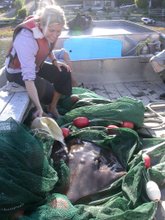The only photo evidence we have received to date of white sharks are from inj

If you have any past or recent shark sightings in the waters off British Columbia we want to hear from you. Email your sighting details to shark_reports_bc@yahoo.ca
Sharks, skates and rays are cartilaginous marine fish that inhabit coastal waters of British Columbia. Knowledge of these species is very limited because they are highly mobile, elusive and long-lived. We hope to fill in knowledge gaps of this group of marine fish and you can help! Find out how you can contribute to this project through this website.

The only photo evidence we have received to date of white sharks are from inj

If you have any past or recent shark sightings in the waters off British Columbia we want to hear from you. Email your sighting details to shark_reports_bc@yahoo.ca







